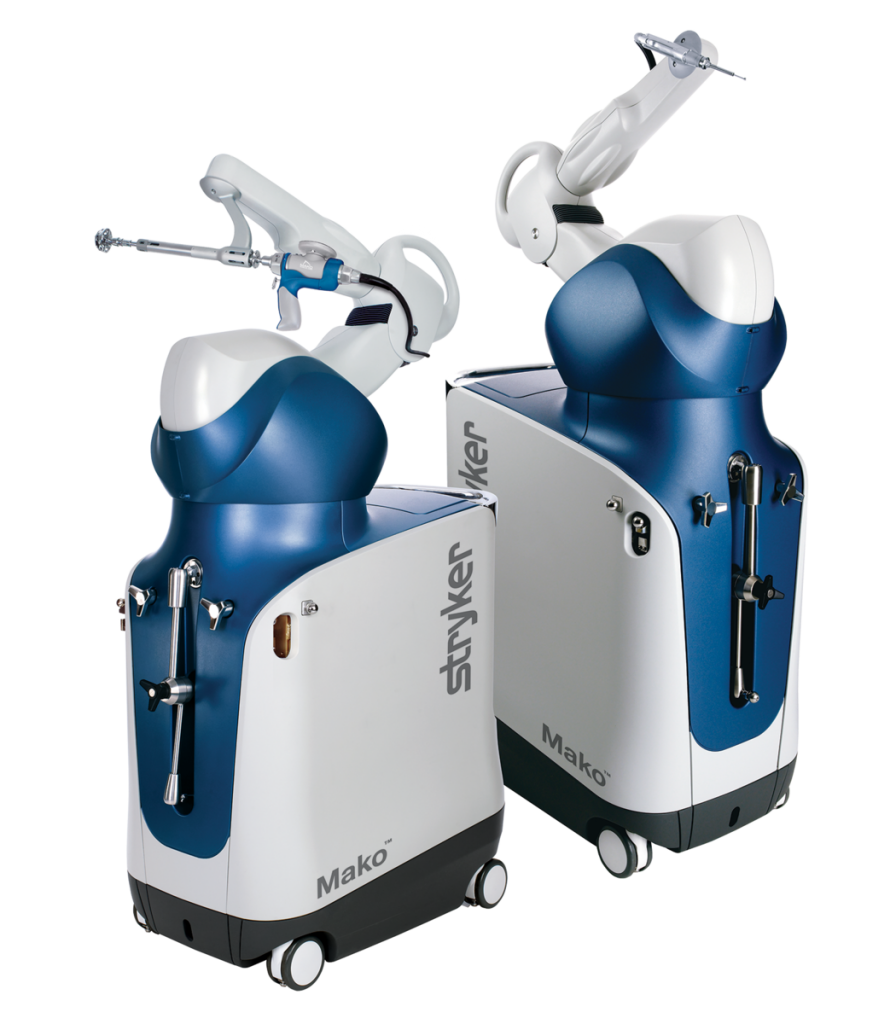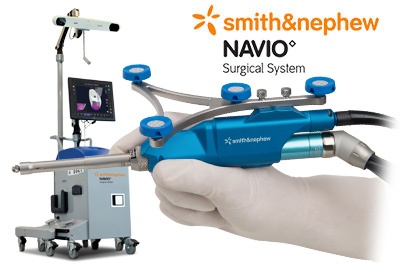Robotic Hip/Knee Replacement: Is It Right For You?
Robots are the future…at least that’s what we hear!
For the past few years, robotic assistance in orthopedic surgery has become increasingly popular. National advertisement campaigns showing patients after robotic-assisted joint replacements recovering more quickly and gaining better function are filling internet searches for total hip and knee replacements. The real question is, does it matter? Does robotic assistance in hip and knee replacement really make a difference? Should you as a patient or family member seek out surgeons using this technology?
What is Robotic Surgery for Joint Replacement?

Robotic surgery performed with the now common robotic arm, the MAKO by Stryker, had the first surgery performed in 2006. Since that time, marked advancement in the technology and application has been experienced. In 2013, MAKO was officially acquired by Stryker and the system now allows for total and partial knee replacements in addition to hip replacements. It utilizes a CT-guided plan to help guide component placement during the operation. It allows for next-generation levels of preparation and execution during surgery, ideally improving outcomes and recovery.

Similarly, in 2016, Smith & Nephew acquired the Navio, a handheld robotic system for partial and total knee replacement from Blue Belt Technologies. This imageless system utilizes advanced techniques for anatomic mapping and balancing to help execute a very precise plan during surgery. It provides direct feedback and guidance during surgery to help limit error.
Both of these technologies are completely surgeon controlled, but add another dimension of precision to a procedure. They provide constant feedback on location, similar to how a GPS system works in a car. The difference is that if the surgeon deviates from the plan without preparing to do so, the robotic controls will stop the deviation and help limit the risk of human error.
Robotic Surgery for Hip/Knee Replacement Matter?
The reason for the robotic revolution in orthopedics is precision. Many patients and surgeons ask if robotic assistance is necessary or if it actually helps patients. Those who are proponents of robotics site the use of technology while driving. Now that we have GPS and phones to give directions, would you ever go back to using a paper map? Sure, you could definitely get from point to point B, and if you’ve driven the route thousands of times you would be comfortable, but if the plan changes or anatomy is slightly different than expected, would you be ready? If there was a better or more efficient route to be ready or anticipate issues, why wouldn’t you use it?
Literature repeatedly shows that the most experienced surgeons in the world have an error rate of >3% from acceptable during knee replacement, and the error rate is even higher in hip replacement when using conventional instruments. With robotic technology, that deviation from ideal/planned is <1%. With robotic technology, the window of error is 1mm!
Patients and surgeons often ask if that matters. The most simple and honest answer right now is that we are not entirely sure. Research has shown that there are trends towards better outcomes, lower long-term costs, and greater implant longevity. Truthfully, the technology has not been around long enough to say that hips and knee will last forever because of the robotic technologies, but what we can say with complete confidence is that implants are placed with more precision because of them. If we can make the perfect and individualized plan for each patient, and execute it precisely, than there can be no better attempt at nearing the perfect, reproducible joint replacement.
The real key to success is the right patient, for the right surgery, with the right surgeon. If all of these metrics are met, and there is a tool that your “right” surgeon is using to be even better and more accurate, than the real question should be, why you would want it done any other way!
Since 2017, Dr. Werger has been performing all varieties of hip and knee replacement with robotic assistance. He is one of the most experienced robotic surgeons in New England, and continues to work on optimizing the technology for every patient.
Contact our office today to meet Dr. Werger and see if you are a good candidate for hip or knee replacement.